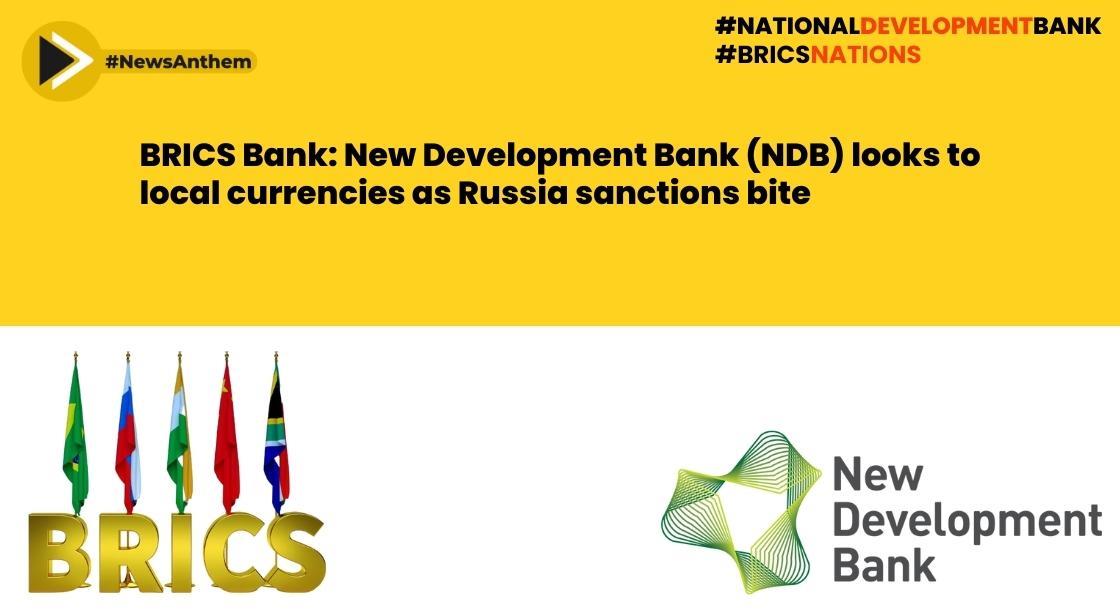BRICS Bank: New Development Bank (NDB) looks to local currencies as Russia sanctions bite

News Synopsis
NDB's Focus on Local Currencies Amid Russia Sanctions: A Bid for Financial Resilience
The New Development Bank (NDB), a multilateral development bank set up by the BRICS countries, is looking to increase its use of local currencies in lending as it faces challenges from sanctions against Russia,South Africa and India,
The NDB has been hampered by the sanctions against Russia, which have made it more expensive for the bank to borrow in dollars. This has led to a slowdown in lending, with the bank only disbursing about $1 billion in loans in 2022.
To reduce its reliance on the dollar, the NDB is looking to increase its use of local currencies in lending. The bank has already issued bonds in China and is planning to issue bonds in South Africa and India.
The NDB is also looking to expand its membership, which would bring in more capital and help the bank to become more self-sufficient. The bank has already added three new members since 2021, and it is in talks with several other countries about joining.
The NDB's move to increase its use of local currencies is a sign that the bank is adapting to the changing global financial landscape. The sanctions against Russia have shown that the dollar is not always a safe haven, and the NDB is looking to diversify its funding sources.
BRICS Summit Agenda: Local Currencies in the Spotlight
The upcoming BRICS summit in Johannesburg is set to be a platform for leaders of the member nations - Brazil, Russia, India, China, and South Africa - to deliberate on strategies that can enhance the bloc's influence.
One of the key discussions on the agenda, according to South Africa's Finance Minister Enoch Godongwana, is the elevation of local currency usage within the NDB's member countries. The objective is to mitigate the risks stemming from foreign exchange fluctuations and enhance financial stability.
Beyond De-Dollarisation: Managing Foreign Exchange Risks
While the aim is not outright de-dollarisation, the focus on local currency usage within NDB holds immense significance. The NDB acknowledges the need to de-risk the impact of foreign exchange volatility, particularly given the greenback's surge against emerging market currencies following Russia's actions in Ukraine and the Federal Reserve's interest rate hikes. The increased cost of servicing dollar-denominated debt poses a challenge to member countries' fiscal health.
Rethinking Lending Strategies: Addressing Dollar Dependence
The dependence on U.S. capital markets has been an Achilles' heel for NDB, resulting in heightened borrowing costs due to sanctions. The bank aims to mitigate this challenge by increasing its local currency fundraising efforts and capital infusion from new members. The objective is to reduce reliance on the U.S. dollar and diversify funding sources to safeguard the bank's financial sustainability during uncertain times.
Strategic CFO Insights: Navigating Currency Dynamics
Leslie Maasdorp, Chief Financial Officer of NDB, emphasizes the bank's commitment to maintaining its operating currency in dollars, primarily due to the massive liquidity pools associated with the U.S. currency. The focus is on striking a balance between the strategic utilization of local currencies and harnessing the advantages of the dollar liquidity. The bank aims to align its lending mix with the demands of member countries, ensuring flexibility and resilience.
Future Prospects: Local Currency Growth and Membership Expansion
The NDB is resolute in its pursuit of increasing local currency lending to approximately 30% by 2026, up from the current 22%. This move signifies a step towards bolstering financial resilience and minimizing external vulnerabilities. Moreover, the bank's aspiration to expand its membership is a testament to its commitment to becoming a prominent institution in the emerging market landscape. As more nations express interest in joining, NDB's governance structure and operational approach will evolve to accommodate the changing dynamics.
Some relevant and latest facts about the New Development Bank (NDB) and its response to the Russia sanctions:
-
The NDB was founded in 2015 by the BRICS countries (Brazil, Russia, India, China, and South Africa) as an alternative to the World Bank and the International Monetary Fund.
-
The NDB has approved loans worth $32.8 billion for projects in member countries, but it has only disbursed about $1 billion of loans so far.
-
The NDB's lending slowed down in 2022 due to the Russia sanctions, which made it more expensive for the bank to borrow in dollars.
-
The NDB has issued bonds in China and South Africa in an effort to reduce its reliance on the dollar.
-
The NDB is also looking to expand its membership, which would bring in more capital and help the bank to become more self-sufficient.
-
The NDB is in talks with several countries about joining, including Algeria, Honduras, Zimbabwe, and Saudi Arabia.
The NDB's move to increase its use of local currencies and expand its membership is a sign that the bank is adapting to the changing global financial landscape. The Russia sanctions have shown that the dollar is not always a safe haven, and the NDB is looking to diversify its funding sources.
Conclusion: NDB's Resilient Path in a Shifting Global Landscape
The NDB's strategic response to Russia sanctions exemplifies its agility and resilience in navigating complex geopolitical and financial challenges. By embracing local currencies while maintaining a measured dependence on the dollar, the bank charts a course that enhances its financial stability and contributes to the economic growth and stability of its member nations.
As the BRICS bloc gathers to deliberate on these pivotal strategies, the NDB's journey continues to underscore the evolving role of emerging market institutions in the global arena.
You May Like









